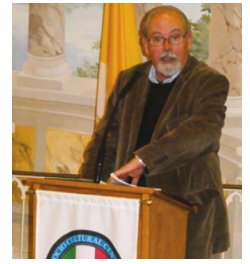Author Paul Paolicelli Tells HOW ITALIANS CHANGED AMERICA
Paul Paolicelli
The new year was off to a great start, with well-known author Paul Paolicelli drawing a crowd of just over 100 people for his talk about “How Italians Changed America.” Our first program of the year was held on January 26, 2020 at Casa Italiana. Paul, who now lives in North Carolina, returned to Casa Italiana after more than five years. Some attendees recalled that in his previous talk, he told about his life-changing experiences in Southern Italy that deepened the admiration and affection he feels for this part of Italy. AMHS member Dave Ciummo originally suggested Paul as our speaker. Paul was also interviewed by AMHS member Kirsten Keppel in her film about St. Joseph’s Table which was featured at our March 2019 meeting.
Those who left Italy for America didn’t bring valuables; they brought values.
Paul told us that his interest in his Italian heritage really grew after he became friends with his news colleague Tom Capra, the son of the famous Frank Capra, who immigrated from a small farming town near Palermo at the age of 6 and directed such movie classics as ”It’s a Wonderful Life.” Paul said his long talks with Tom Capra led him to eventually meet one of Frank Capra’s relatives who lived near Corleone, Sicily. When asked to comment on Frank Capra, the relative said that those who left Italy for America didn’t bring valuables; they brought values. In other words, they didn’t have much in the way of material things, but they brought with them their strong work ethic and determination, their love of family, and their faith.
After achieving professional success in the television news business (he was news director for NBC-TV in Washington for 10 years), Paul decided to move to Rome for a few years, where he learned Italian, played in a jazz band, and spent considerable time in Abruzzo, Basilicata, Calabria and Sicily — the journey he wrote about in his first book, “Dances with Luigi.” Encouraged by the book’s success, he wrote a second book, “Under the Southern Sun: Stories of the Real Italy and the Americans It Created” because he wanted to try to find out why so many of the Southern Italians who emigrated to the U.S. became successful in just one generation — bankers, film directors, politicians, scientists, business leaders, artists, musicians and athletes.
Now he said he is working on a third book, tentatively titled “The Good Father.” Paul noted that “The Godfather” movies were among the most successful movies of all time and were great cinematic achievements, but the bottom line is that they were based on a lie— that Italians are largely Mafia gangsters and criminals— while the truth is that Italians or Italian-Americans comprise only a tiny percentage of the prison population. He noted that ever since Italians started immigrating to America, there have been slurs that they were criminals and undesirables. He said that even Frank Capra was referred to as “Dago” by one of his peers in Hollywood. Paul pointed to historical events such as the mass lynching of Sicilians in New Orleans in 1891 and the 1924 law limiting immigration from Southern Europe and said this sad state of affairs only began to change during and after World War II.
One reason, he noted, was that Italian-Americans enlisted in the war effort in numbers almost double their percentage of the American population, even though it meant they would be fighting against the country of their ancestors. Paul explained that another reason for the acceptance of Italian-Americans in American culture and society was the growing popularity of entertainers such as Frank Sinatra and Dean Martin, and athletes such as Yogi Berra and Rocky Marciano. Then in the 1950s and 1960s, many of the popular teenage idols were Italian-American — Frankie Valli, Bobby Rydell, Dion and Annette Funicello — and they became mainstream. Paul told us that since his last visit in 2014, he had taught a course at the University of Calabria, and, together with his colleague Sam Patti, has been involved with the Foundation for Italian Diaspora Studies which helps fund the program at the University of Calabria.
This year the foundation raised enough to fund a Fulbright Fellow (Stan Pugliese from Hofstra University) who will be lecturing this year in Calabria. Paul noted that it’s only been in the last 10 years or so that Italians have become interested in investigating the history of Italian migrations in the world. Before the talk, we heard from AMHS scholarship winner Thomas Ronan . We also enjoyed a delicious lunch catered by one of everyone’s favorites, Osteria da Nino. We closed by raffling off some wonderful prizes which brought in $295 for our AMHS programs. Many thanks to those who helped serve the lunch and to those who donated raffle prizes and bought tickets. We also heard an update on two of our previous speakers. Sara Forden, the Bloomberg editor, spoke to us about her book, “The House of Gucci: A Sensational Story of Murder, Madness, Glamour and Greed.” Sara says her book is now being made into a movie directed by Ridley Scott with Lady Gaga in the title role of Maurizio Gucci’s wife Patrizia who was convicted of his murder.
Also, you may remember Katherine Wilson, who talked to us about her adventures going to Naples, marrying a Neapolitan guy and also feeling intimidated by and then falling in love with his stylish, supremely self-confident mother. Katherine had mentioned to us that she was moving with her family from Naples to Rome to try to take advantage of her training at the Princeton Drama School. Now she has small roles in two big films, “The Two Popes” and “ToloTolo,” a satirical comedy that is breaking box office records in Italy. ❚


